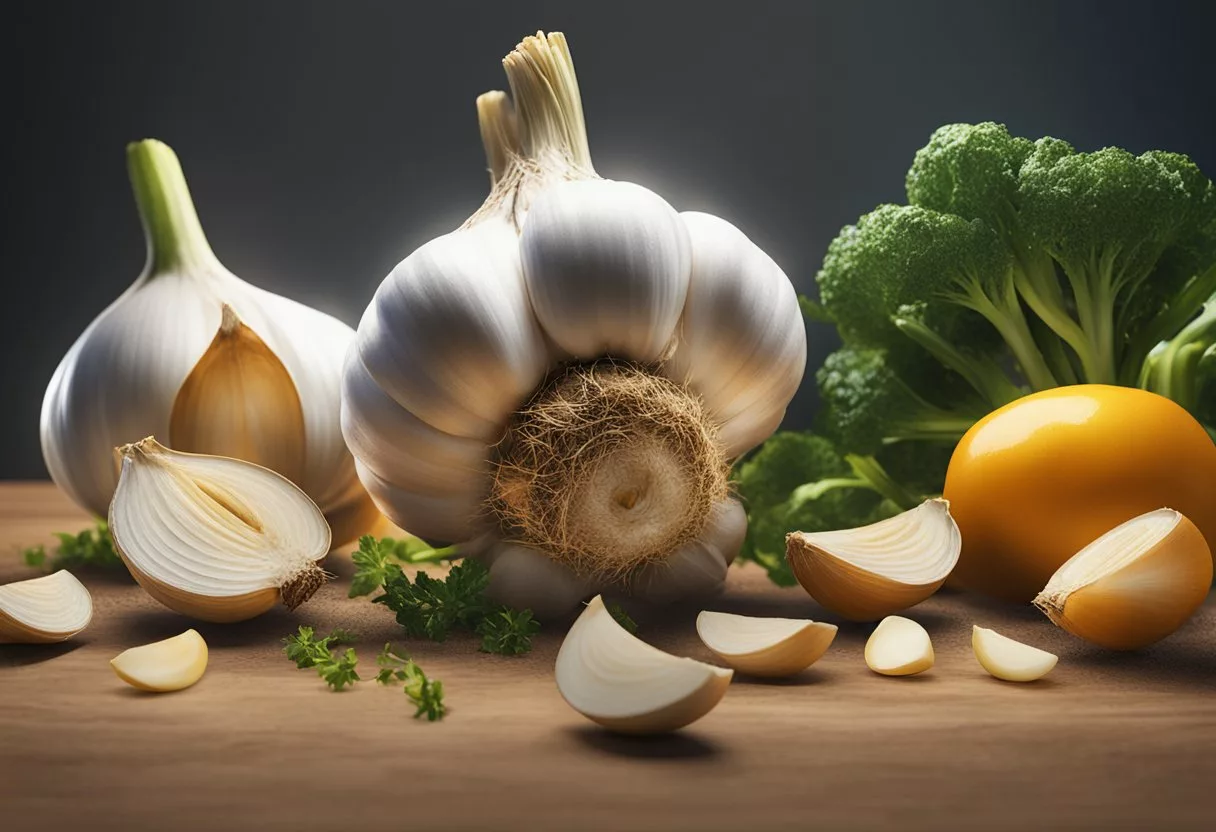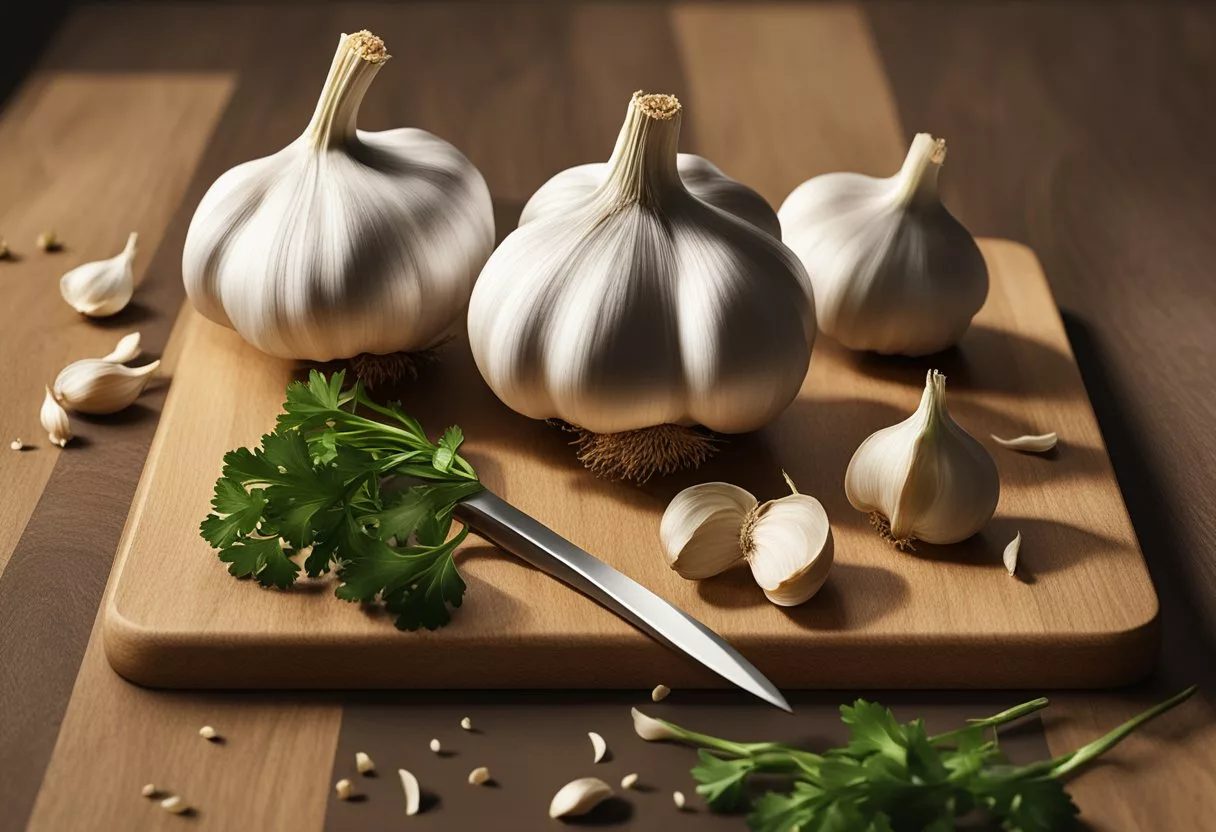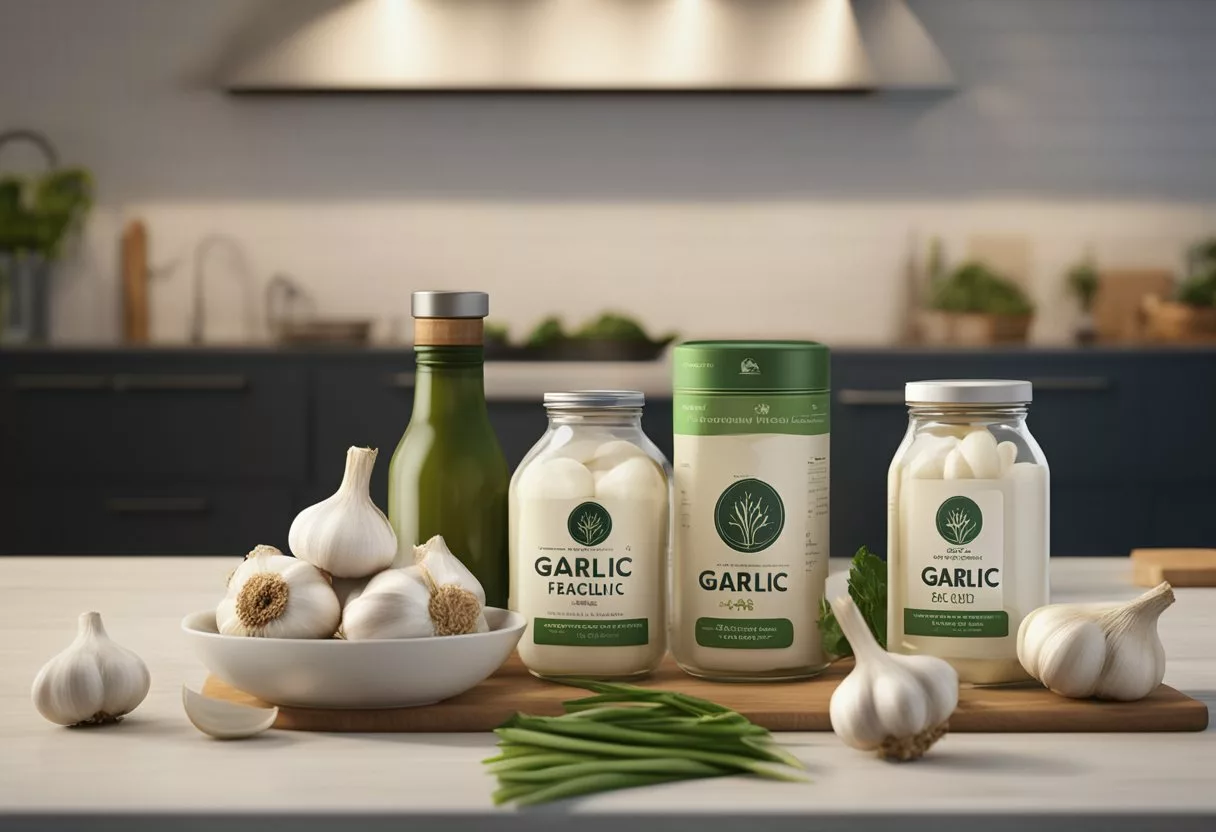Garlic has been used for centuries for both culinary and medicinal purposes. It is a member of the onion family and has a pungent aroma and taste. Garlic is a versatile ingredient in cooking and is also known for its numerous health benefits.

Garlic contains a compound called allicin, which is responsible for its distinct aroma and many of its health benefits. Allicin is formed when garlic is crushed or chopped, and it has been shown to have antibacterial, antiviral, and antifungal properties. Garlic also contains other sulfur compounds that contribute to its health benefits.
Garlic has been shown to have numerous health benefits, including reducing blood pressure, improving cholesterol levels, and boosting the immune system. It may also have a protective effect against certain types of cancer and may help prevent cognitive decline. Garlic has also been used as a natural remedy for colds and other respiratory infections.
Key Takeaways
- Garlic contains allicin, a compound responsible for many of its health benefits.
- Garlic has been shown to have antibacterial, antiviral, and antifungal properties.
- Garlic may have a protective effect against certain types of cancer and may help prevent cognitive decline.
Understanding Garlic

Garlic is a widely used ingredient in cooking and is known for its distinct aroma and flavor. It has been used for both culinary and medicinal purposes for thousands of years. This section will provide an overview of the historical significance, nutritional profile, and varieties of garlic.
Historical Significance
Garlic has been used for medicinal purposes since ancient times. It was believed to have healing properties and was used to treat a variety of ailments such as infections, digestive issues, and respiratory problems. Garlic was also used in religious ceremonies and was believed to ward off evil spirits.
Nutritional Profile
Garlic is low in calories and rich in nutrients. According to Healthline, one clove of garlic (3 grams) contains the following:
- Protein: 0.6 grams
- Fat: 0.1 grams
- Carbohydrates: 0.9 grams
- Fiber: 0.1 grams
- Vitamin C: 1% of the Daily Value (DV)
- Vitamin B6: 2% of the DV
- Manganese: 2% of the DV
- Selenium: 1% of the DV
Garlic also contains small amounts of other nutrients such as potassium, iron, magnesium, zinc, and phosphorus.
Varieties of Garlic
There are many varieties of garlic, but the two main types are softneck and hardneck garlic. Softneck garlic is the most common type and is often found in grocery stores. It has a milder flavor and a longer shelf life than hardneck garlic. Hardneck garlic is less common and has a stronger flavor. It is often used in gourmet cooking.
Fresh garlic is available year-round and can be found in most grocery stores. It is important to store garlic properly to prevent it from spoiling. Garlic should be stored in a cool, dry place and should not be refrigerated.
In summary, garlic is a flavorful and nutritious ingredient that has been used for both culinary and medicinal purposes for thousands of years. It is low in calories and rich in vitamins and minerals, making it a healthy addition to any diet. With its many varieties and uses, garlic is a versatile ingredient that can be enjoyed in a variety of dishes.
Health Benefits of Garlic

Garlic has been used for centuries as both a food ingredient and a medicinal herb. It is packed with nutrients and compounds that have numerous health benefits. Here are some of the health benefits of garlic:
Cardiovascular Health
Garlic has been shown to have a positive impact on cardiovascular health. It may help lower blood pressure and cholesterol levels, which are two major risk factors for heart disease. Garlic contains allicin, a compound that has been found to have anti-blood clotting properties, which can help prevent heart attacks and strokes.
Immune System Support
Garlic is also known for its immune system support. It has been shown to have antibacterial, antiviral, antifungal, and antimicrobial properties, which can help fight off infections and diseases. Garlic contains sulfur compounds that can help boost the immune system and improve overall health.
Anti-Inflammatory Effects
Garlic has anti-inflammatory effects that can help reduce inflammation in the body. Chronic inflammation is linked to many diseases, including cancer, heart disease, and Alzheimer's disease. Garlic contains antioxidants that can help reduce inflammation and protect against oxidative damage.
Antioxidant Impact
Garlic is a rich source of antioxidants, which can help protect the body against oxidative damage caused by free radicals. Free radicals are unstable molecules that can damage cells and contribute to the development of diseases such as cancer, heart disease, and Alzheimer's disease.
Antimicrobial Properties
Garlic has been shown to have antimicrobial properties that can help fight off bacteria and viruses. It may be effective against common colds, flu, and other infections. Garlic contains a compound called allicin, which has been found to have antiviral activity and may help prevent the spread of viruses.
In conclusion, garlic has numerous health benefits, including cardiovascular health, immune system support, anti-inflammatory effects, antioxidant impact, and antimicrobial properties. Incorporating garlic into your diet may help improve your overall health and reduce the risk of developing diseases such as cancer, heart disease, and Alzheimer's disease.
Garlic in Diet and Cooking

Garlic is a versatile ingredient that can be used in a variety of recipes to add flavor and nutrition. Incorporating garlic into a healthy diet can provide numerous health benefits. Here are some ways to use garlic in cooking and some tips for getting the most out of its nutritional value.
Incorporating Garlic into Recipes
Garlic can be used in a wide range of recipes, from soups and stews to sauces and marinades. It can be added to dishes both raw and cooked, and can be used in combination with other herbs and spices to create a unique flavor profile. Some popular recipes that use garlic include garlic bread, garlic shrimp, and garlic mashed potatoes.
When incorporating garlic into recipes, it is important to note that the flavor can vary depending on how it is prepared. Raw garlic has a strong, pungent flavor that can be overpowering in some dishes. Cooked garlic, on the other hand, has a milder flavor and can add depth and complexity to a dish.
Raw vs. Cooked Garlic
Raw garlic is known to have more health benefits than cooked garlic. This is because some of the beneficial compounds in garlic, such as allicin, are heat-sensitive and can be destroyed during the cooking process. However, cooking garlic can also have some benefits. It can make the garlic easier to digest and can help to reduce its strong odor.
To get the most nutritional value out of garlic, it is recommended to consume it raw. However, if you prefer the milder flavor of cooked garlic, you can still benefit from its many health benefits by incorporating it into your diet in other ways.
Garlic-Infused Oils and Supplements
Garlic can also be consumed in the form of garlic-infused oils and supplements. Garlic oil is made by infusing garlic cloves in olive oil or another type of oil. It can be used as a cooking oil or as a dressing for salads and other dishes. Garlic supplements, such as aged garlic extract, are also available and can provide a concentrated dose of the beneficial compounds found in garlic.
It is important to note that while garlic supplements can be a convenient way to consume garlic, they should not be used as a replacement for a healthy diet. It is always best to get your nutrients from whole foods whenever possible.
Overall, incorporating garlic into your diet and cooking can provide numerous health benefits. Whether you prefer it raw or cooked, in a recipe or as a supplement, garlic is a versatile ingredient that can add flavor and nutrition to your meals.
Potential Side Effects and Interactions

Garlic is generally considered safe when consumed in moderate amounts. However, some people may experience side effects or interactions with medications. It is important to be aware of these potential concerns before consuming garlic supplements or large amounts of garlic.
Digestive Concerns
Garlic can cause digestive issues such as bloating, upset stomach, and diarrhea, especially when consumed in large amounts. These side effects are often worse with raw garlic. To minimize digestive concerns, it is recommended to start with small amounts of garlic and gradually increase the intake.
Allergic Reactions
Some people may have an allergic reaction to garlic. Symptoms of an allergic reaction may include itching, swelling, and difficulty breathing. If you experience these symptoms after consuming garlic, seek medical attention immediately.
Medication Interference
Garlic may interfere with certain medications, particularly blood thinners such as warfarin. Garlic supplements may increase the risk of bleeding, especially if taken with other blood-thinning medications. It is important to talk to a healthcare provider before consuming garlic supplements if you are taking any medications.
Other medications that may interact with garlic include HIV medications and medications used to treat high blood pressure. Garlic may decrease the effectiveness of these medications.
It is also important to note that garlic may interfere with surgery. Garlic supplements should be stopped at least two weeks prior to surgery to reduce the risk of bleeding.
In conclusion, while garlic has many potential health benefits, it is important to be aware of potential side effects and interactions with medications. If you experience any concerning symptoms after consuming garlic, seek medical attention immediately.
Garlic’s Role in Chronic Disease Prevention

Garlic is a popular spice that has been used for centuries for its medicinal properties. Recent studies have shown that garlic has potential health benefits in preventing chronic diseases such as cancer, heart disease, high blood pressure, and cognitive decline.
Cancer Prevention
Garlic contains various sulfur compounds that have been shown to have anti-cancer properties. These compounds can inhibit the growth of cancer cells and prevent new cancer cells from forming. Studies have shown that garlic consumption is associated with a reduced risk of certain cancers such as stomach, colon, and prostate cancer.
Bone Health and Arthritis
Garlic contains compounds that may help improve bone health and prevent osteoporosis. It has been shown to increase estrogen levels in women, which can help prevent bone loss. Additionally, garlic has anti-inflammatory properties that may help reduce inflammation associated with arthritis.
Cognitive Health
Garlic has also been shown to have potential benefits for cognitive health. Studies have suggested that garlic may help improve memory and cognitive function, as well as reduce the risk of neurodegenerative disorders such as Alzheimer's disease.
Overall, garlic has potential health benefits in preventing chronic diseases such as cancer, heart disease, high blood pressure, and cognitive decline. While more research is needed to fully understand the mechanisms behind these benefits, incorporating garlic into a healthy diet may be a simple and effective way to promote overall health and well-being.
Scientific Research and Evidence

Clinical Studies on Garlic
Garlic has been the subject of numerous clinical studies, which have explored its potential health benefits. A systematic review of the effects of garlic on cardiovascular diseases found that garlic can help prevent and treat cardiovascular diseases by lowering blood pressure, cholesterol, and inflammation [1]. Another study found that garlic can improve immune function by increasing the activity of natural killer cells and lymphocytes [2].
Garlic and Modern Science
Modern science has also explored the potential health benefits of garlic. Garlic is a rich source of polyphenols and organosulfur compounds, which have been found to have antioxidant, anti-inflammatory, and lipid-lowering properties [3]. These compounds have been shown to have potential benefits for a wide range of health conditions, including cancer, cardiovascular and metabolic disorders, blood pressure, and diabetes [4].
Research has also explored the potential therapeutic uses of garlic and its compounds, such as allicin and ajoene. Studies have found that these compounds have antimicrobial, antifungal, and antiviral properties, and may have potential for use in treating infections and other diseases [5].
Overall, the scientific research on garlic suggests that it may have potential health benefits for a wide range of conditions. However, more research is needed to fully understand the mechanisms behind these benefits and to determine the optimal doses and forms of garlic for therapeutic use.
References:
- Garlic: A systematic review of the effects on cardiovascular diseases
- Potential Health Benefit of Garlic Based on Human Intervention Studies: A Brief Overview
- Garlic (Allium sativum) as a natural antidote or a protective agent against toxic chemical exposure: a review
- Garlic: Health benefits and actions
- Revealing the Therapeutic Uses of Garlic (Allium sativum) and Its Bioactive Compounds in Cancer, Cardiovascular, and Other Diseases
Garlic’s Nutritional Enhancements

Garlic as a Prebiotic
Garlic contains a type of carbohydrate called fructooligosaccharides (FOS) that acts as a prebiotic. Prebiotics are non-digestible food components that stimulate the growth and activity of beneficial bacteria in the gut. Garlic's FOS content helps feed the good bacteria in the gut, promoting a healthy balance of gut microbiota. This can lead to improved digestion and better nutrient absorption.
Synergy with Other Nutrients
Garlic's nutritional profile includes a variety of vitamins and minerals, including vitamin C, vitamin B6, and manganese. These nutrients work together to enhance the body's overall health and well-being. For example, vitamin C helps the body absorb iron from plant-based sources, while vitamin B6 is important for brain development and immune system function.
Garlic also contains trace amounts of other nutrients, such as selenium and fiber. Selenium is a mineral that acts as an antioxidant, protecting cells from damage caused by free radicals. Fiber helps regulate digestion and promotes feelings of fullness, which can aid in weight management.
Here are some nutrition facts for garlic:
| Nutrient | Amount per 100g |
|---|---|
| Calories | 149 |
| Protein | 6.36g |
| Fat | 0.5g |
| Carbohydrates | 33.06g |
| Fiber | 2.1g |
| Vitamin C | 31.2mg |
| Vitamin B6 | 1.235mg |
| Manganese | 1.672mg |
In conclusion, garlic's nutritional enhancements make it a valuable addition to a healthy diet. Its prebiotic content promotes gut health, while its combination of vitamins and minerals provides a variety of health benefits.
Additional Uses of Garlic

Garlic in Skincare
Garlic has been used in skincare for centuries due to its anti-inflammatory and antibacterial properties. It can help in treating acne, skin rashes, and other skin conditions. Garlic contains allicin, which has been found to have antimicrobial properties that can help in fighting off bacteria that cause acne. It also contains sulfur, which can help in reducing inflammation and redness.
One way to use garlic in skincare is to crush a few cloves and mix them with honey to form a paste. This paste can be applied to the face and left on for 10-15 minutes before rinsing off with warm water. It is important to note that garlic can be irritating to the skin, so it is recommended to do a patch test before using it on the face.
Garlic for Respiratory Conditions
Garlic has been found to have benefits for respiratory conditions such as asthma and colds. Garlic contains compounds that can help in reducing inflammation and improving immune function. It can also help in reducing the severity and duration of colds.
One way to use garlic for respiratory conditions is to make garlic tea. Simply crush a few cloves of garlic and add them to boiling water. Let the mixture steep for a few minutes before straining and drinking. It is important to note that garlic can interact with certain medications, so it is recommended to consult a healthcare professional before using it for medicinal purposes.
Overall, garlic has many potential health benefits that make it a valuable addition to any diet or skincare routine. However, it is important to use it in moderation and to be aware of any potential side effects or interactions with medications.
Frequently Asked Questions

How does consuming garlic affect men’s sexual health?
Garlic has been traditionally used as an aphrodisiac and to improve sexual health in men. Some studies suggest that consuming garlic may help improve erectile dysfunction and increase testosterone levels. However, more research is needed to confirm these findings.
What are the potential skin benefits of using garlic?
Garlic has been shown to have antibacterial and antifungal properties, which may help to treat skin infections and reduce inflammation. It may also help to improve skin health by increasing blood flow and promoting collagen production. However, garlic can cause skin irritation and should be used with caution.
What improvements might women notice in their sexual health from garlic consumption?
There is limited research on the effects of garlic on women's sexual health. However, some studies suggest that garlic may help to improve libido and reduce symptoms of menopause, such as hot flashes and mood swings. More research is needed to confirm these findings.
Are there specific benefits to eating garlic at night?
There is no evidence to suggest that eating garlic at night provides any specific health benefits. However, consuming garlic at any time of day may help to improve overall health by boosting the immune system, reducing inflammation, and lowering the risk of chronic diseases.
How does daily garlic intake benefit overall health?
Garlic is a rich source of vitamins and minerals, including vitamin C, vitamin B6, and manganese. It also contains antioxidants and sulfur compounds that have been shown to have anti-inflammatory and antibacterial properties. Regular garlic consumption may help to reduce the risk of heart disease, lower blood pressure, and improve cholesterol levels.
What are the advantages of ingesting garlic without chewing?
Garlic can be ingested in a variety of forms, including capsules, powders, and oils. Ingesting garlic without chewing may help to reduce the strong odor and taste associated with raw garlic. However, chewing garlic releases more of its beneficial compounds and may provide greater health benefits.